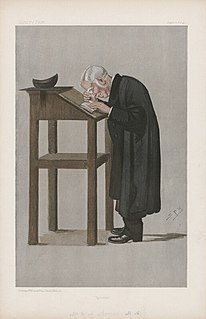A Quote by Samuel Johnson
Criticism, as it was first instituted by Aristotle, was meant as a standard of judging well.
Related Quotes
If there is a well thought-out design standard, it should be followed. In practice, great design comes from great designers. That is empirically the case. If a great designer did a first-rate standard, that model should be followed. Great design is not democratic; it comes from great designers. If the standard is lousy, then develop another standard.
Anyone living, especially your peers, is a threat. You're judging them, they're judging you. This sort of criticism is as close to human nature as you can get. That can be a good thing sometimes. Jealously, rancor, competition, those can be good things in art. But it mostly puts you in a dangerous and disadvantageous position, and one that just takes away from you so much.
Through Plato, Aristotle came to believe in God; but Plato never attempted to prove His reality. Aristotle had to do so. Plato contemplated Him; Aristotle produced arguments to demonstrate Him. Plato never defined Him; but Aristotle thought God through logically, and concluded with entire satisfaction to himself that He was the Unmoved Mover.






































